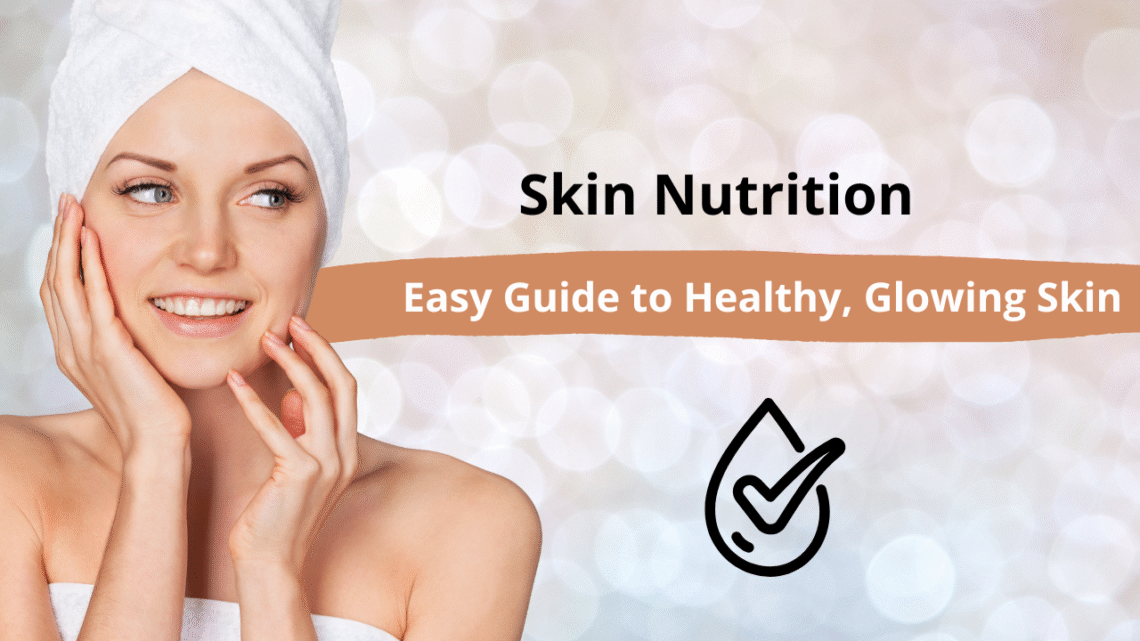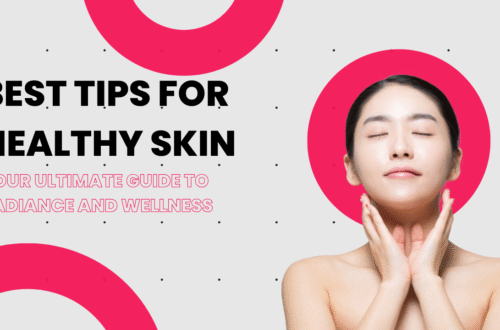When we think of radiant, glowing skin, most of us imagine expensive creams, serums, and countless hours spent at the spa. But while skincare products are helpful, true skin health starts from within — through proper skin nutrition. What you eat plays a vital role in the way your skin looks, feels, and ages. By fueling your body with the right nutrients, you can help your skin stay youthful, clear, and strong for years to come.
When it comes to achieving radiant, healthy skin, many people focus only on creams and external treatments. However, true beauty begins from within, and that’s where skin nutrition plays a crucial role. By understanding how the right nutrients work, you can transform your skin naturally and achieve a glowing complexion that lasts. Proper skin nutrition supports hydration, boosts collagen production, and protects your skin from damage caused by free radicals and environmental stressors.
In this detailed guide, we’ll uncover the fascinating science behind skin nutrition and explain how certain foods can significantly improve your skin’s health and appearance. By choosing the right ingredients, such as colorful fruits, leafy greens, nuts, seeds, and healthy fats, you supply your body with the essential vitamins and minerals needed for a strong, smooth, and vibrant complexion. These powerful foods nourish your skin from the inside out, making it more resilient and youthful over time.
We’ll also share the top 8 nutrition tips to help you achieve the skin of your dreams. These practical strategies focus on integrating balanced meals, staying hydrated, reducing sugar, and supporting gut health. With the right approach to skin nutrition, you can enjoy naturally beautiful, glowing skin and feel confident in your own radiant glow every day.
Why Skin Nutrition Matters
Your skin is your body’s largest organ and serves as the first line of defense against environmental damage. It protects you from bacteria, toxins, UV radiation, and injury. But to function optimally, your skin needs the right building blocks — vitamins, minerals, healthy fats, and antioxidants.

When your diet lacks essential nutrients, it can show up on your skin as dryness, dullness, acne, premature aging, or increased sensitivity. On the other hand, a well-balanced diet can help your skin repair itself, maintain moisture, and fight off damage from free radicals.
In essence, what you put on your plate is just as important as what you put on your skin.
The Science Behind Skin Nutrition
Skin health relies on several biological processes, including collagen production, cellular turnover, hydration, and protection against oxidative stress.
Here’s a quick look at some key nutrients and how they contribute:
- Vitamin C: Essential for collagen synthesis and a powerful antioxidant that protects against sun and pollution damage.
- Vitamin E: Helps prevent oxidative damage and supports skin barrier function.
- Vitamin A (Retinol): Supports cell growth and renewal, helps maintain skin integrity, and reduces acne.
- Omega-3 fatty acids: Maintain skin’s lipid barrier, reduce inflammation, and keep skin supple.
- Zinc: Supports wound healing, reduces inflammation, and regulates oil production.
- Selenium: Protects the skin from sun damage and supports immune function.
- Protein: Fundamental for tissue repair and collagen production.
- Water: Essential for maintaining skin hydration and elasticity.
A diet rich in these nutrients helps keep your skin resilient, glowing, and youthful.
Top 8 Skin Nutrition Tips for Healthy, Glowing Skin
1. Eat More Colorful Fruits and Vegetables

One of the most powerful ways to improve your skin health is by adding more brightly colored fruits and vegetables to your meals. These vibrant foods are a key part of skin nutrition because they’re rich in essential antioxidants, vitamins, and minerals that protect your skin at a cellular level. Antioxidants help fight free radical damage, which is a major cause of premature aging, dullness, and wrinkles. By filling your plate with a rainbow of colors, you’re providing your skin with the tools it needs to stay youthful and strong.
Berries, for example, are loaded with vitamin C, which supports collagen production and helps maintain skin elasticity. Carrots and sweet potatoes are excellent sources of beta-carotene, a nutrient that converts into vitamin A and promotes cell turnover, giving your skin a healthy glow. Tomatoes offer a powerful antioxidant called lycopene, which can help protect your skin from sun damage and improve its texture.
Leafy greens like spinach and colorful vegetables such as bell peppers are also packed with skin-loving nutrients. Including these foods in your daily diet is an easy and effective step toward better skin nutrition. With every bite, you’re not just feeding your body — you’re actively nourishing your skin and supporting a radiant, youthful complexion from the inside out.
Berries are rich in vitamin C and flavonoids, which protect the skin and improve collagen strength. Carrots and sweet potatoes contain beta-carotene, which converts to vitamin A and supports skin cell turnover.
2. Include Healthy Fats in Your Diet
Healthy fats, especially omega-3 fatty acids found in fatty fish (salmon, sardines, mackerel), walnuts, flaxseeds, and chia seeds, help keep your skin moisturized from within. They strengthen the skin’s barrier, reduce inflammation, and prevent dryness.
Avocados are one of the most powerful superfoods you can include in your diet for optimal skin nutrition. Known for their creamy texture and rich taste, avocados are loaded with healthy fats, particularly monounsaturated fats, which help keep your skin moisturized and supple from within. These healthy fats strengthen the skin’s natural barrier, preventing dryness and promoting a soft, smooth texture that many people strive for.
Another key benefit of avocados is their high vitamin E content. Vitamin E is a potent antioxidant that helps protect your skin from oxidative stress caused by free radicals, pollution, and UV rays. By reducing this damage, vitamin E supports healthier, more youthful-looking skin and helps minimize signs of premature aging such as wrinkles and fine lines. Including avocados in your meals is a simple yet highly effective step toward boosting your overall skin nutrition.
You can easily add avocados to salads, smoothies, sandwiches, or even enjoy them on their own with a little lemon and salt. By making avocados a regular part of your diet, you’re not just satisfying your taste buds — you’re deeply nourishing your skin from the inside out. This small, delicious addition can make a big difference in achieving a radiant, glowing complexion through thoughtful skin nutrition.
3. Hydrate, Hydrate, Hydrate
Water is crucial for flushing out toxins and keeping your skin hydrated and plump. Dehydrated skin can look dull and show fine lines more prominently.
One of the most essential yet often overlooked steps in achieving healthy, glowing skin is staying properly hydrated. Water plays a crucial role in skin nutrition, as it helps flush out toxins, maintain elasticity, and keep your skin looking plump and fresh. When your body is dehydrated, your skin can quickly become dry, tight, and more prone to irritation and fine lines. By focusing on hydration, you support your skin’s natural ability to repair and protect itself.
To maintain optimal hydration levels, aim to drink at least 8–10 glasses of water every day. This simple habit can make a significant difference in your skin’s overall appearance and texture. In addition to drinking water, you can further support skin nutrition by including water-rich foods in your diet. Cucumbers, for example, are over 95% water and help soothe and hydrate the skin from within.
Other excellent hydrating foods include watermelon and oranges. These fruits not only provide water but are also rich in vitamins and antioxidants that enhance skin health. By combining sufficient water intake with these hydrating foods, you create a powerful foundation for glowing skin. Making hydration a daily priority is a simple yet highly effective strategy for achieving long-lasting, radiant skin through proper skin nutrition.
4. Get Plenty of Protein

Your skin is made up of proteins like collagen and elastin, which maintain its structure and elasticity. A diet lacking protein can result in sagging skin and poor wound healing.
Protein is a vital building block when it comes to achieving healthy, glowing skin, and it plays a crucial role in effective skin nutrition. Your skin relies on protein to repair damaged cells, support regeneration, and maintain its firmness and elasticity. Without enough high-quality protein in your diet, your skin can become weak, lose its youthful appearance, and heal more slowly from breakouts or injuries. By prioritizing protein, you’re providing your skin with the essential amino acids it needs to stay strong and vibrant.
To boost your skin nutrition, include a variety of high-quality protein sources in your daily meals. Lean meats such as chicken and turkey are excellent options, providing complete proteins that are easily absorbed by the body. Eggs and dairy products like yogurt and cheese offer not only protein but also important vitamins and minerals that further enhance skin health.
If you prefer plant-based options, tofu, legumes (such as lentils and chickpeas), and nuts are fantastic choices. These foods supply a rich mix of proteins and other skin-supporting nutrients like zinc and healthy fats. By incorporating these diverse protein sources into your diet, you help your skin repair, renew, and maintain its youthful glow, making skin nutrition an essential part of your beauty routine..
5. Cut Down on Sugar and Processed Foods
A diet high in sugar and processed foods can lead to inflammation and a process called glycation, where sugar molecules damage collagen and elastin fibers. This accelerates skin aging and may contribute to acne flare-ups.
When it comes to skin nutrition, one of the most important steps you can take is reducing your intake of refined sugars. High-sugar diets can trigger inflammation and a process called glycation, which damages collagen and elastin — two proteins responsible for keeping your skin firm and youthful. This damage can lead to premature aging, dullness, and breakouts. By cutting down on refined sugars, you protect your skin from these harmful effects and support a clearer, healthier complexion.
Instead of processed sweets and sugary snacks, swap refined sugars for natural sweeteners like honey, dates, or pure maple syrup. These alternatives provide a touch of sweetness without causing drastic spikes in your blood sugar levels. Additionally, natural sweeteners contain beneficial antioxidants and minerals that further support skin nutrition and overall wellness.
Along with replacing sugar, focus on choosing whole, unprocessed foods as often as possible. Fresh fruits, vegetables, whole grains, nuts, and seeds are packed with vitamins, minerals, and fiber that nourish your skin from the inside out. By making these simple changes, you’ll strengthen your skin’s natural barrier, promote a radiant glow, and take a major step toward achieving long-lasting beauty through proper skin nutrition
6. Add Zinc and Selenium-Rich Foods
Zinc helps reduce inflammation, heal acne, and regulate oil production. Good sources include oysters, pumpkin seeds, chickpeas, nuts, and whole grains.
Selenium is an essential mineral that plays a powerful role in skin nutrition, yet it often gets overlooked. This important nutrient acts as a strong antioxidant, helping to defend your skin against oxidative damage caused by pollution, sun exposure, and everyday stressors. By fighting free radicals, selenium helps prevent premature aging, fine lines, and dullness, allowing your skin to stay healthy and youthful for longer.
One of selenium’s most impressive qualities is its ability to work together with vitamin E. When combined, these two nutrients enhance each other’s effectiveness, boosting your skin’s defense system and supporting its natural elasticity. Healthy elasticity is crucial for keeping your skin firm, smooth, and resistant to sagging over time. Prioritizing selenium in your diet is a smart strategy for anyone focused on improving their skin nutrition and achieving a more radiant complexion.
To make sure you’re getting enough selenium, include foods like Brazil nuts, mushrooms, eggs, and seafood in your meals. Just one or two Brazil nuts a day can meet your daily selenium needs! By adding these nutrient-rich options, you’ll nourish your skin from within and strengthen its resilience. Supporting your skin with proper skin nutrition is one of the best ways to reveal your natural, glowing beauty.
7. Incorporate Probiotics for a Healthy Gut
A healthy gut is closely connected to healthy skin. Gut imbalances can lead to conditions like acne, eczema, and rosacea.
When talking about skin nutrition, many people forget that a healthy gut is deeply connected to a healthy, glowing complexion. Fermented foods are a fantastic way to support your gut health because they are rich in probiotics — beneficial bacteria that help balance your digestive system. A balanced gut improves nutrient absorption, meaning your body can better utilize the vitamins and minerals needed to keep your skin strong and radiant.
Fermented foods like yogurt, kefir, kimchi, sauerkraut, and miso are excellent sources of these friendly bacteria. Including them regularly in your meals helps reduce inflammation throughout the body, which can lower the risk of skin issues like acne, redness, and sensitivity. By improving digestion and promoting a healthy gut microbiome, fermented foods enhance your overall skin nutrition, working from the inside out to support a clearer and healthier complexion.
Adding these foods to your diet doesn’t have to be difficult. You can start your day with a bowl of yogurt topped with fruit and nuts or add a serving of kimchi or sauerkraut to your lunch or dinner. Even small, consistent changes can make a noticeable difference. By focusing on gut health as part of your skin nutrition plan, you’ll be taking an important step toward naturally beautiful, glowing skin.
8. Don’t Forget Vitamins C and E
These two antioxidants work together to protect skin from sun damage, pollution, and other environmental stressors.

Vitamins C and E are two of the most powerful nutrients when it comes to achieving healthy, glowing skin, making them essential pillars of effective skin nutrition. Vitamin C is a potent antioxidant that supports collagen production, which keeps your skin firm and smooth. It also helps repair damaged skin cells and protects against environmental stressors like pollution and UV rays. Citrus fruits, strawberries, kiwi, and bell peppers are all rich sources of vitamin C and can easily be added to your daily meals or snacks.
Vitamin E, on the other hand, helps protect your skin from oxidative stress and keeps it deeply nourished and moisturized. This vitamin works especially well when paired with vitamin C, as they enhance each other’s antioxidant effects, creating a stronger defense against premature aging and dullness. You can find vitamin E in nuts, seeds, spinach, and avocado — all foods that are delicious and easy to incorporate into any diet focused on skin nutrition.
Combining these two vitamins in your meals is a powerful way to boost your skin’s resilience and natural radiance. By choosing colorful fruits, leafy greens, and healthy fats, you provide your body with everything it needs to nourish and protect your skin from the inside out. Prioritizing these vitamins is a simple yet effective strategy for achieving long-lasting beauty through proper skin nutrition.
Foods to Include for Better Skin Nutrition
Here’s a list of skin-loving foods to prioritize:
- Fatty fish: Rich in omega-3 fatty acids and protein.
- Avocado: Packed with healthy fats and vitamin E.
- Walnuts and seeds: Omega-3s, zinc, and vitamin E.
- Sweet potatoes and carrots: Beta-carotene (vitamin A precursor).
- Tomatoes: Lycopene, vitamin C, and antioxidants.
- Berries: Vitamin C and antioxidants.
- Dark chocolate (70% or higher): Flavanols that improve skin hydration and circulation.
- Green tea: Polyphenols that fight inflammation and support elasticity.
- Red and yellow peppers: High in vitamin C and beta-carotene.
- Broccoli: Vitamin C, vitamin K, and zinc.
- Spinach and leafy greens: Vitamins A, C, E, and K.
Foods to Avoid for Healthy Skin
While certain foods promote glowing skin, others can contribute to breakouts, inflammation, and aging. It’s wise to limit:
- Refined sugar and sweets: Promotes glycation and acne.
- High-glycemic foods (white bread, pastries): Cause insulin spikes that may worsen acne.
- Excess dairy: Can trigger acne in some people.
- Processed meats and trans fats: Increase inflammation and may damage skin collagen.
- Alcohol: Dehydrates the skin and impairs nutrient absorption.
Supplements for Skin Nutrition
While a balanced diet is the best source of nutrients, some people may benefit from supplements to fill in nutritional gaps.
Common skin-focused supplements include:
- Collagen peptides: Support elasticity and reduce wrinkles.
- Omega-3 capsules: Help if you don’t eat enough fatty fish.
- Vitamin C and E supplements: For enhanced antioxidant support.
- Zinc and selenium tablets: For acne-prone or inflamed skin.
- Probiotics: Improve gut health and reduce skin inflammation.
Always consult a healthcare professional before starting supplements.
The Role of Lifestyle in Skin Nutrition
Nutrition is critical, but overall lifestyle habits also impact skin health. Combine good skin nutrition with:
- Adequate sleep: Repairs skin and reduces inflammation.
- Regular exercise: Boosts circulation and promotes detoxification.
- Stress management: Chronic stress can worsen acne and cause flare-ups.
- Sun protection: Prevents damage and premature aging.
Skin Nutrition for Specific Skin Concerns
Acne-Prone Skin
- Focus on zinc-rich foods, omega-3s, and antioxidants.
- Reduce dairy and sugar.
- Include probiotic-rich foods for gut balance.
Dry or Aging Skin
- Prioritize healthy fats, vitamin E, and water-rich fruits and vegetables.
- Eat collagen-boosting foods like bone broth and citrus fruits.
- Add avocado, nuts, and seeds for deeper hydration.
Sensitive or Redness-Prone Skin
- Increase intake of anti-inflammatory foods like fatty fish and green leafy vegetables.
- Avoid spicy foods, alcohol, and caffeine if they trigger reactions.
- Add soothing foods like cucumbers and oatmeal.
The Connection Between Mind and Skin

Emerging research suggests a powerful “gut-brain-skin axis,” meaning mental health and digestion are directly linked to skin health. Chronic stress can cause hormonal imbalances, leading to increased oil production and breakouts.
When it comes to achieving radiant, healthy skin, most people focus only on diet and skincare products. However, your emotional and mental health play a huge role in your overall skin nutrition and appearance. Stress is a major factor that can lead to inflammation in the body, which often shows up on the skin as breakouts, redness, or premature aging. Managing stress effectively is just as important as eating the right foods if you want clear, glowing skin.
Practices like meditation, yoga, and mindful eating are excellent tools for reducing stress and promoting relaxation. Meditation helps calm your mind, balance your hormones, and reduce levels of cortisol — a stress hormone known to worsen skin problems. Yoga combines gentle movement with deep breathing, improving circulation and supporting detoxification, both of which benefit skin health. These activities together create a strong foundation for better skin nutrition by helping the body function optimally.
Mindful eating also plays a key role. By paying attention to what and how you eat, you improve digestion and allow your body to absorb nutrients more effectively. This means your skin receives more of the vitamins and minerals it needs to stay healthy and vibrant. Focusing on mental wellness, alongside proper skin nutrition, offers a powerful, holistic approach to achieving long-lasting beauty from the inside out.
Building a Sustainable Skin Nutrition Plan
A great skin nutrition plan should be realistic, enjoyable, and sustainable.
Here are some practical tips:
- Plan meals ahead and include a variety of colorful vegetables and fruits.
- Replace sugary drinks with herbal teas and water infused with lemon or cucumber.
- Keep healthy snacks like nuts, seeds, and yogurt handy.
- Practice mindful eating — enjoy and savor your food.
- Make small, gradual changes rather than drastic overhauls to avoid burnout.
Final Thoughts: Glowing Skin Starts from Within
If you dream of clear, radiant, and youthful skin, remember that what you eat is as important as what you apply topically. Proper skin nutrition gives your body the essential nutrients to repair, regenerate, and protect your skin naturally.
Achieving long-lasting, glowing skin isn’t just about using the right creams or serums — it starts with proper skin nutrition. By incorporating colorful fruits and vegetables into your diet, you provide your body with essential vitamins, minerals, and antioxidants that protect your skin from damage and support its natural repair processes. These vibrant foods help boost collagen production, improve elasticity, and give your skin a natural, healthy glow.
In addition to fruits and veggies, including healthy fats and quality protein is crucial for skin nutrition. Healthy fats from sources like avocados, nuts, and seeds keep your skin moisturized and strengthen its barrier. Meanwhile, quality protein supports cell repair and regeneration, ensuring your skin remains firm and resilient. Choosing antioxidant-rich foods, such as berries and leafy greens, further shields your skin from premature aging and environmental stress.
Reducing sugar and processed foods is equally important in your journey toward better skin nutrition. High-sugar diets can lead to inflammation and break down collagen, causing dullness and wrinkles. When you pair these dietary improvements with positive lifestyle habits like regular exercise, adequate sleep, and stress management, you’ll notice not only a transformation in your skin but also enhanced overall health and higher energy levels.





